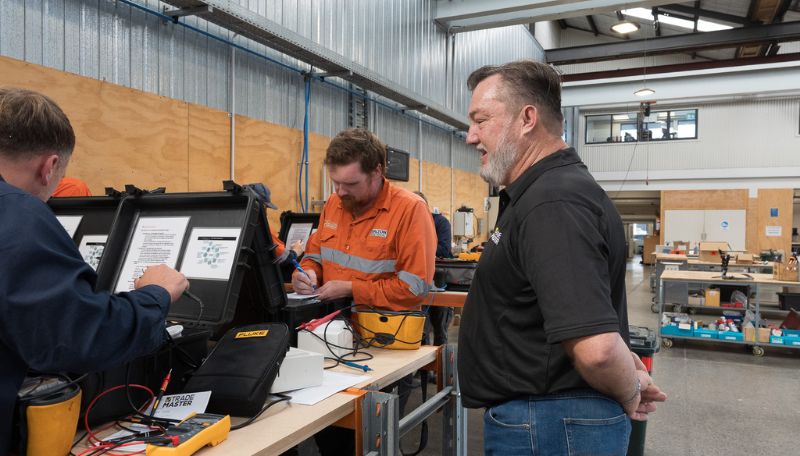Know your Regs - FREE Guide

Master Electricians New Zealand welcomes today’s announcement by Hon. Penny Simmonds, Minister for Tertiary Education and Skills, confirming the establishment of a standalone Industry Skills Board (ISB) for the Electrotechnology and Information Technology sectors. The electrotechnology sector is a major driver of New Zealand’s economy, contributing $30.7 billion to GDP in 2024—7.3% of the national total—and growing at a rate significantly faster than the overall economy. The new ISB will empower the sector to lead workforce development and training that meets the demands of this rapidly expanding and vital industry.
This decision follows sustained advocacy and sector-wide collaboration led by Master Electricians and signals a vital step forward in ensuring industry-led direction and accountability for training, standards, and workforce development in the rapidly evolving tech and energy landscape.
The new ISB will allow the sector to shape vocational education that better reflects real-world needs, supports future-focused training, and keeps pace with innovations in energy, automation, and digital infrastructure.
Alex Vranyac-Wheeler, CEO of Master Electricians, says:
“This is a huge win for the sector and a testament to the strength of our industry voice. The Electrotechnology and IT sectors are critical to New Zealand’s transition to a low-emissions, high-tech economy — and that requires a skilled, future-ready workforce.
We’re grateful to Minister Simmonds for listening to the sector and taking action. Establishing a dedicated Industry Skills Board means we can drive more relevant training, lift quality, and better support businesses and learners alike. It’s a move that empowers industry to lead from the front.”
The Electrotechnology and IT sectors encompass a wide range of critical roles, from electricians and security technicians to network infrastructure specialists and smart systems integrators. With growing demand for skilled professionals in areas like solar, energy efficiency, automation, and digital connectivity, the sector’s training needs are unique and rapidly evolving. These fields are no longer just trades—they are the foundation of New Zealand’s digital and energy future. The ISB responds to a mounting skills crisis driven by an aging workforce, rapid technological change, and soaring infrastructure demands. Crucially, this initiative empowers industry-led solutions, giving Master Electricians and their members direct influence over training standards that reflect real-world conditions.
The new ISB is expected to work alongside the Tertiary Education Commission (TEC) and other stakeholders to ensure qualifications, training providers, and industry standards are fit-for-purpose and responsive to emerging technologies.
Further background:
New Zealand stands at a critical juncture in the energy transition, with electrotechnology at the heart of innovation and productivity advancement and sustainable growth across virtually all sectors. Electrification and its constantly advancing sophistication are going to power productivity in all other industries. The data shows the electrical/electrotechnology sector is a high-value industry, contributing significantly to New Zealand’s GDP and productivity. It also outperforms the national economy in both growth rate and productivity metrics, indicating strong economic and skilled workforce potential if positioned strategically as with its own Industry Skills Board:
- 156,915 people worked in the New Zealand electrotechnology sector in 2024.
- 25,860 of these people were self-employed (for a self-employment rate of 16.5%, compared with the national average of 15.5%).
- 35,399 businesses operated in the sector in 2024, with an average annual growth of 3.3% over the last decade, exceeding New Zealand’s total business growth rate of 2.0% per year.
- Sector GDP in 2024: $30.7 billion, accounting for 7.3% of New Zealand’s total GDP.
- Annual GDP growth rate over five years (2019-2024): 3.6%, compared to 2.3% for the total economy.
- Annual GDP growth rate over 10 years (2014-2024): 4.1%, compared to 3.0% for the total economy.
- GDP per full-time equivalent (FTE): $206,118, significantly higher than New Zealand’s average of $165,995.
- Annual productivity growth rate (2019-2024): 0.8%, compared to 0.1% for the total economy. Businesses in the sector continue to grow faster than the total economy, indicating strong entrepreneurial activity.
Forecasts for growth potential are significant
- Forecasted employment in 2030: 171,333 (growing from 156,915 in 2024).
- Projected job openings in the sector (2025-2030): 944,753 (including replacement demand).
- Professionals make up the largest occupational segment in the sector, accounting for 57.6% of job openings between 2025-2030.
